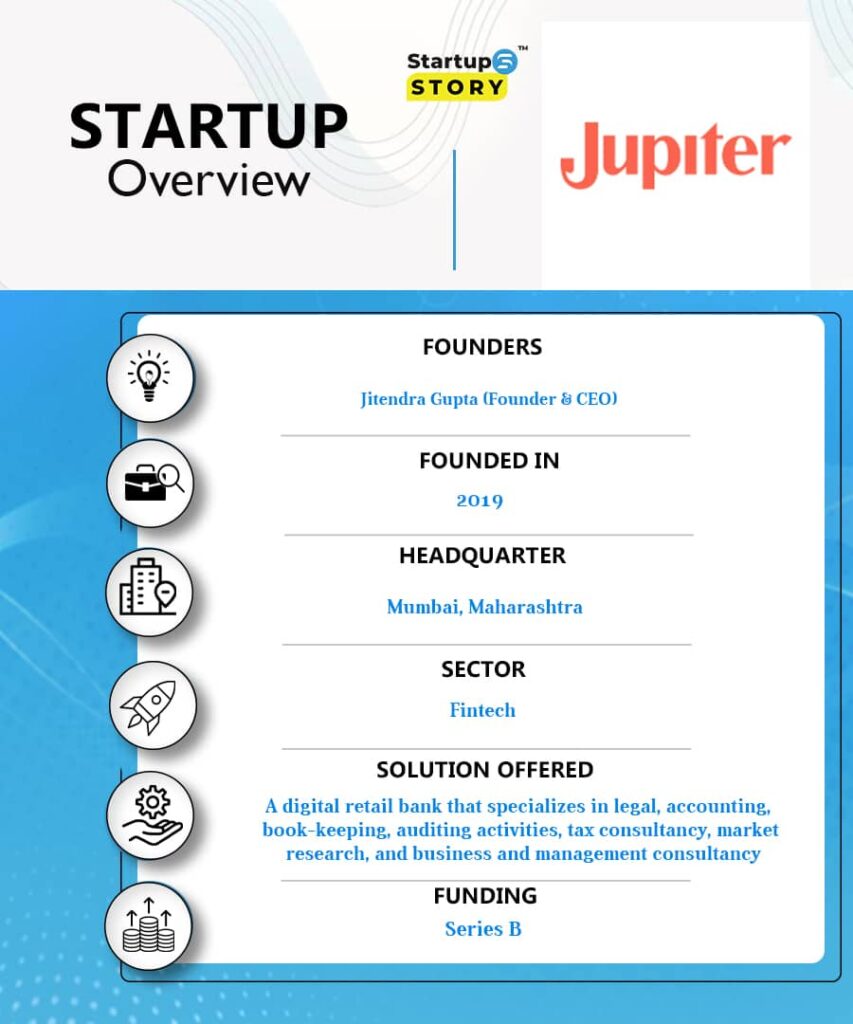Jupiter – Keep the pace of banking with you
- ByStartupStory | December 18, 2021

“There was this feeling that I had not created anything large and impactful even after being in the startup ecosystem for 10 years. I felt restless.”
Jitendra Gupta , Founder , Jupiter
Even little amounts of money, ranging from Rs 100 to Rs 200, can now be transferred online. Nobody in today’s world has to carry cash around with them when they go outside. Life has grown a lot easier now that no one has to be concerned about robberies or other financial hazards. All of this is due to the rise of digital banking. This digital banking, which began as a subset of physical banks or financial institutions, is now rapidly evolving into a separate organization that provides all retail banking services to customers.
Jupiter is one of the most promising digital banking businesses based on the neobanking model. Jupiter, based in Mumbai, Maharashtra, offers a variety of banking and account-related services, as well as unique savings pots, real-time spend breakdowns and insights, real-time monitoring of your net worth, and more, all of which may come with attractive benefits. As a result, with Jupiter, you can easily control your finances. At Jupiter, there are no hidden fees. This financial firm also offers its customers quick incentives like no other.
ABOUT THE ORGANIZATION : JUPITER
Big banks offer a variety of services, but they are typically one-size-fits-all or prohibitively expensive for regular users. Furthermore, most consumers and retail bankers are unaware of the variety of financial services available through their bank account.
Jupiter is a neobank, or digital banking company, that provides end-users with a variety of digital retail banking services, allowing them to open and manage bank accounts from the comfort of their own homes. Jupiter, based in Mumbai, Maharashtra, also provides consumers with unique features such as wealth tracking, real-time spend breakdowns with insights, and handy savings pots to help people save for their purchases. Additionally, all of these can be handled in real time. Unlike many banks, the organization does not deduct hidden fees. Furthermore, Jupiter bank accounts do not require a minimum amount to be maintained. Furthermore, the funds in your Jupiter account can be quickly withdrawn from any of the nearby ATMs in your area. Jupiter is also regarded as one of the fastest UPI-based payment apps.

Jupiter, according to Gupta, approaches these difficulties in a variety of ways. No one knows what products or services a traditional bank is developing; this is not the case at Jupiter, which is developing openly. On the open project on Trello, anyone may see the neo bank’s current priority areas, request new features, and provide constructive criticism to the product team.
THE MAN BEHIND THE NAME
Jitendra Gupta is the company’s founder and CEO, Jupiter. Before starting Jupiter, he was the Managing Director of PayU for more than two years. Jitendra Gupta has previously started a company called Citrus Payment Solutions Pvt Ltd. He also worked with ICICI Bank as the Chief Manager and Regional Sales Manager for a total of seven years. Jitendra Gupta started his career as an Article Trainee at Lodha & Co. before working as a Staff Accountant at RSM & Co. for a short time. Jitendra Gupta earned a BCOM degree from Sydenham College of Commerce and Economics before pursuing a Chartered Accountant degree.
THE STARTUP STORY
Jitendra Gupta had worked for Naspers-owned PayU for three years when he began his second phase of entrepreneurship in August 2019, with the goal of founding “something significant and meaningful,” which he had missed out on despite having spent over ten years in the startup environment. Gupta eventually chose to apply his finance and banking knowledge to a disruptive notion that would revolutionize the old banking system. He wanted to provide all Indians with a mobile-first experience. His ambition to create a cost-effective and bright digital banking space for Indians eventually came to fruition in the form of Jupiter, which allowed the younger generations to better manage their money.

Gupta claims that he personally engages in feature talks with potential clients, attempting to understand why customers choose one feature over another. These are the people that will have early access to the game starting tomorrow. The other significant distinction is how Jupiter handles consumer goals, as opposed to a bank, where saving activity is unrelated to outcomes. “We’re using a finance app approach, in which a consumer’s financial goals are highly personalized and contextual.” As a result, you can’t use a one-size-fits-all strategy. And this is where our greater aim is — how do we help some people achieve their financial goals and serve as their guide for financial discipline, which is the world’s biggest challenge today,” says the neobank’s founder and CEO.
THE CHANGING BANKING SCENARIO :-WORKING MODEL
Due to a shift in consumer perceptions of banking, a wave of startups have launched net banking services, with the majority of them focusing on corporate users rather than retail customers. Apart from Jupiter, India presently has more than a half-dozen neobanks vying for market share in the BFSI industry, including Open, NiYO, Hylo, PayZello, InstaDApp, YeLo, ChqBook, FamPay, Walrus, epiFi, Finin, and RazorPay X, among others.
According to KBV Research, the global neobanking market is estimated to reach $333.4 billion by 2026, growing at a 47.1 percent CAGR from 2020. The market size for neobanks like Jupiter in India is unknown, but prominent neobanks in the country have raised more than $500 million since 2019, including Jupiter’s $24 million round, the $335 million raised by Razorpay since 2019, $35 million raised by Open and Niyo each; epiFi, which raised $13.2 million from Sequoia and Ribbit Capital last year; and more than $43 million invested in FamPay since 2019.
Many of these neobanks have also carved out a sizable market share. For example, Open, which is backed by Tiger Global, 3one4 Capital, and Beenext, promises to have over 500K customers and handle $15 billion in year transactions (as of December 2020). Niyo claims to have more than 2.5 million users worldwide, but it’s unknown how many are utilizing its digital savings bank account, which it has partnered with Equitas Small Finance Bank. Many neobanking firms focus on NRI banking, SME banking, and startup corporate accounts, whereas Jupiter’s concentration would be on retail or consumer banking, where there are numerous pain points.Customers will be able to get access to a bank account, the opportunity to aggregate their money on the app, the option to use UPI, and a clear reward system that includes discounts for app partners as well as cashback on spending during the initial phase of the launch.
Jupiter, according to Gupta, is seeking to differentiate itself in the area of customer service. Despite the creation of fancy relationship manager jobs at banks, he believes the standard of banking customer care has dropped in recent years. Gupta says that the customer care experience is similar to that of Swiggy or Zomato, where users can simply send a message to ban cards or activate services.

THE GROWTH ANALYSIS
Jupiter’s beta app presently serves 100,000+ individuals on the waitlist and will ultimately be made available to the general public as well. Jupiter has launched the Bullet Money app, a micro-lending (‘Buy Now Pay Later’) app that will provide clients with small-ticket loans of up to Rs 10,000 to utilize for UPI-led transactions. Bullet, like LazyPay, which Jitendra launched at PayU, has already had over half a million downloads.
GROWTH AND CONCLUSION
Neobank Jupiter is also thought to be in talks with QED Investors, a US-based venture capital firm, to co-lead a fresh $100 million funding round with its existing backer Sequoia Capital India, according to sources familiar with the situation. According to them, Tiger Global, based in New York, is in talks with Jupiter to participate in the investment round. Tiger Global is one of India’s most aggressive venture investors. Jupiter’s value will more than treble to about $700 million if the deal goes through.Jupiter is also currently set against the challenge of maintaining the “fine balance between compliance and agility.”









